
Arquivo para a ‘Jornais on-line’ Categoria
The dangerous limits of war
After a bombing killed civilians in the Lyiv region,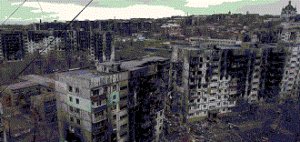 in the early hours of yesterday a plane bombing hit a school building that was used for humanitarian aid in the Zaporizhya region of Ukraine, killing 4 people and injuring 13 others since the beginning of the war. Russia denies having civilian targets, but the massacre in the Bucha region will go down in history (the current city of Mariupol in the photo).
in the early hours of yesterday a plane bombing hit a school building that was used for humanitarian aid in the Zaporizhya region of Ukraine, killing 4 people and injuring 13 others since the beginning of the war. Russia denies having civilian targets, but the massacre in the Bucha region will go down in history (the current city of Mariupol in the photo).
On the other hand, the United States should offer cluster bombs, which mutilate and kill in the region where they are used, making a purely military analysis that the advances of the Ukrainian counteroffensive would happen more quickly.
In Spain, which will hold elections on the 23rd, defense minister Margarida Robles is against sending this type of ammunition, while Germany is against Ukraine’s entry into NATO, since in times of war a country cannot adhere to the treaty. .
The British Prime Minister followed the Spanish position, but told reporters that “we will continue to do our part to support Ukraine against the illegal invasion”.
Former President and Prime Minister of Russia Dimitri Medvedev has again referred to “nuclear armageddon” due to American support for war and position on illegal bombs.
The controversy with the Russian mercenary group Wagner continues, and the sending of new Russian troops in the order of hundreds of thousands to the front indicated that the group’s complaint that the generals omit the death toll is probably correct, and the number of War casualties may be higher than reported.
Certainly the number of deaths will continue and the nuclear danger is increasingly entering the world’s reports, judgment and balance are expected in the midst of a difficult situation in world history.
Mercenaries, Intense Combat and the Threat of Peace
The war in Eastern Europe remains a center of  concern for world peace, after some advances by the Ukrainian army, Russia again advanced in the east in combat described as “fierce” and slow advances by the Ukrainians in the south, but there are threats around Europe’s largest nuclear power plant, the Zaporizhzhia that still worry.
concern for world peace, after some advances by the Ukrainian army, Russia again advanced in the east in combat described as “fierce” and slow advances by the Ukrainians in the south, but there are threats around Europe’s largest nuclear power plant, the Zaporizhzhia that still worry.
The debates around the Wagner group, their real objectives and the dangers for both the Russians and the West follow, since their methods and interests are ruthless and cruel, and thinking that they could have access to the nuclear arsenal makes the fact even more dangerous. .
The pope sends a bishop for talks with the Russian Orthodox Church, which can also be a mediator, since it has access to Putin and the religious dialogue between the churches can favor a future peace agreement.
The involvement of NATO and its European allies grows with each new step in the war, and now Russian Chancellor Lavrov has gone on to say that Zelensky is a puppet, which intensifies the confrontation with Europe and raises the level of tension.
Until the beginning of the European autumn (spring here in the south of the hemisphere) the war should remain intense, but with little advances from side to side, the problem with autumn there and the proximity of winter is that it becomes more strategic due to the climate, the dependency on energy and a growing difficulty in moving on the ground, until then a peace strategy is important.
The world is waiting for some truce, but the scenario is increasingly complex, since the West, through NATO, is increasingly involved in the conflict, while Russian contempt and cruelty towards Ukraine grows with each combat since the loss of life intensifies the climate of animosity and the economic situation deteriorates.
The world and people of common sense are waiting for peace, for a negotiated solution and the resumption of peaceful life in the region, which would also improve the human condition in the world.
Internal Tension in Russia and Peace
On Saturday (24/06) there was an uprising of troops allied with the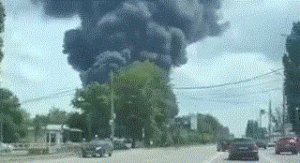 mercenary group Wagner, of Yevgeny Prigozhin, owner of restaurants and catering companies in Russia, called “Putin’s Chef”, but he himself would like to be called a butcher for his cruelty of your troops.
mercenary group Wagner, of Yevgeny Prigozhin, owner of restaurants and catering companies in Russia, called “Putin’s Chef”, but he himself would like to be called a butcher for his cruelty of your troops.
Departing from the strategic military city of Rostov on-Don in the south of Russia and close to the Black Sea, therefore close to the coast where Russia invaded the territory of Ukraine, after the capture of the Russian military base, the group walked towards Moscow and on In a few hours I was only 200 km away from Moscow, which had already taken steps with barricades and there was even an explosion in oil tanks, in Voronezh, near Moscow (photo).
The shooting down of at least 6 aircraft and a helicopter was also recorded, however the entry into Moscow would not be peaceful and other bases would come to fight the rebel group, Putin considered it a “stab in the back” and initially condemned Prigozhin and his allies by ordering them to be captured and even gave a statement on state television.
With the intervention of the President of Belarus Aleksandr Lukashenko a negotiation was made, the terms of which are not clear, but which exempted Prigozhin and his allies from any blame and political asylum was offered in Belarus, and the troops retreated to avoid “a bloodbath” and by Saturday night the rebellion had already retreated from the bases of Rostov on-Don.
A Russian presidential plane was seen heading north, but local information is that Putin would not be on board, there were several analyzes and conspiracy theories, but the shooting down of aircraft and exile and agreement with Prigozhin demonstrate Putin’s internal fragility.
It is good to think that an eventual seizure of power by Prigozhin is more dangerous than the war waged by Putin, since he would have a huge nuclear war arsenal in his hands.
In the midst of a counter-offensive by Ukraine all this means more war and distances peace.
There is a lack of sincere pacifists who are not allies of dictators and cruel mercenaries, but we have hope that it will come if hearts and minds are disarmed
War and humanitarian actions
The explosion of the dam in the region of Nova Kakhovka, region of  Kherson, aroused a stronger humanitarian feeling due to the disaster that is also environmental and that affects all residents of that region, including the Crimea that is Russian domain.
Kherson, aroused a stronger humanitarian feeling due to the disaster that is also environmental and that affects all residents of that region, including the Crimea that is Russian domain.
Despite being a huge and dangerous challenge, Ukraine is the victim of bombing almost every day, many humanitarian organizations help people who live there or who are returning (a large number decided to take the risk), according to the NGO Zoa, help from various NGOs reached around 5.5 million people.
One of the destroyed regions in the north, which borders Russia and Belarus is Cherniguive or Chernigov, there the NGO Zoa helps rebuild life and gives assistance to people, this is a way to encourage people to continue living there (photo ZOA credits).
Iceland has severed relations with Russia, Putin vows to retaliate.
Certainly, life in Ukraine will never be the same again, and generations will remember this horror as they remember the Holodomor (1932-1933) in the Stalinist period, one of the reasons that separate peoples who are ethnically close.
The war enters a period of possibility to escalate to other countries and explode into a new world catastrophe of a global war, Russia has already moved “tactical” nuclear weapons to Belarus, a clear threat to the countries that help Ukraine.
Attempts to establish peace or a ceasefire are increasingly desperate and with little chance of success, but they continue to happen, at this moment they are heroic.
The painful and dangerous stage represented by the Ukrainian counter-offensive and the Russian threats, represent the limits of an even more cruel and dangerous total war, many countries are already taking a stand for a possible intervention and support for one of the sides in this insane war.
The appeal must be made to common sense, true humanitarian values and the danger of an unprecedented civilizational crisis.
The war beyond territorial limits
With very limited attempts at peace, the war in Eastern Europe threatens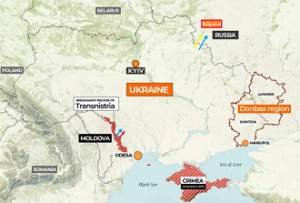 to go beyond the borders, which makes the limits dangerous, both the attempt to invade Russian territory and destabilize Moldova,which now considers being a member country of NATO (its constitution prevents it).
to go beyond the borders, which makes the limits dangerous, both the attempt to invade Russian territory and destabilize Moldova,which now considers being a member country of NATO (its constitution prevents it).
Russia already has weapons and troops in Transnistria, a narrow strip in northern Moldova, while Soviet groups with support from Ukraine begin to launch attacks inside Russian territory.
While Russia’s land and sea access to Moldova is limited, the government of Moldova’s President Maia Sandu has accused Russia of using “saboteurs” disguised as civilians to stoke unrest amid a period of political instability, but Russia would gain access to southern Ukraine, leaving it more besieged and fragile.
The Ukrainian counter-offensive so far seems not to have taken effect, the Donesk region that would be a possible target has not proved fragile, with Russia defending its positions.
In terms of international diplomacy, an ideological alignment begins to grow, the so-called third way, which China and Brazil would also be part of, are increasingly closer to the Russian discourse of “conquered” territories and the discourse of peace is weakened .
Europe will hold a new meeting to discuss Ukraine’s entry into the Eurozone, it seems more plausible than entry into NATO, since in its statute no country at war can enter, it would be a serious exception and Russia would understand a declaration of war open.
Open because the sending of fighter jets and weapons to Ukraine is already a declared support, the countries, however, allege that it is for the “defense” of the territory, and for this reason the entry into territory is not well regarded by the NATO countries, it was even a condition for sending fighter jets to Ukraine.
The week will be decisive with the discussion of the countries of the Eurozone, and the counter-offensive of Ukraine, for the time being many attacks on Kiev, some of which hit children and a clinic.
The signs of peace are increasingly difficult and less effective, what happens is a strong alignment at all levels, from the economic to the political, each side tries to strengthen itself.
War and our dayli bread
As one of the largest grain producers, Ukraine at war would certainly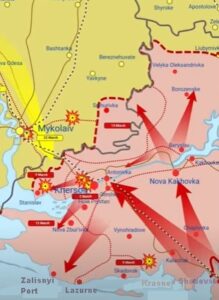 affect the market, and it took a while but it happened, the Chicago Stock Exchange recorded an advance in the price of wheat last week, and soon it will reach the market and our daily bread.
affect the market, and it took a while but it happened, the Chicago Stock Exchange recorded an advance in the price of wheat last week, and soon it will reach the market and our daily bread.
A product on the rise can drag down other products (such as corn, for example), the more advanced countries seemed to already know this and took preventive measures: China, Russia and the USA have already been reinforcing stocks and taking protective measures, in our if we trust agribusiness, but we cannot forget that we are part of a global trade.
And if the war were to end, we drew a picture last week of the Ukrainian counter-offensive and the Russian expectation, which expects a new offensive in the North, as it was in the resumption of Kharkiv last year, but now it seems that the scenario will be different.
The war has grown into technology, Russia has frequently blocked US-made mobile rockets in Ukraine (according to CNN), while Ukraine has intercepted Russia’s sophisticated hypersonic missile (according to Brazilian site G1).
In the North, where the new republics of Donesk are located, according to analyst Niklas Masuhr of the Center for Security Studies at the Federal Polytechnic School of Zurich, Russia has erected trenches in the region, to avoid Ukrainian actions that are always unlikely and change places easily for they know the land (on uol site).
But attacks can happen to the south, despite being small villages around Odessa, such as Lazurne (3,800 inhabitants), Zalizniy Port (1,500 inhabitants) and Krasne (1,300) beach towns and strategic city Zapozhshya.
The Ukrainian tactic has always been to surprise the Russian army and change strategy where it finds less resistance, a good part of the Russian army was withdrawn from the Crimea which is close to this region via the Black Sea, the grain trade is already looking at this scenario.
The week that begins will determine the strategy and tactics of each side, unfortunately the war continues and the damage to all humanity will begin to reach everyone’s table, and the poorest in particular.
The War and its Consequences
We have already emphasized here, outlining a crisis (before the war) that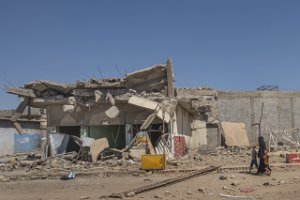 it begins in a way of thinking about the world and consequently the economy, politics and society as a whole, so it is not a question of this or that world, but of all worlds together.
it begins in a way of thinking about the world and consequently the economy, politics and society as a whole, so it is not a question of this or that world, but of all worlds together.
Economics is not separate from them, however it is the most sensitive and the one that is most thought about.
Russia’s oligarchs, those who didn’t migrate or were killed in strange situations, remember the news of Sergey Protosenya, found hanged in Spain and Pavel Antov who fell from the third floor of a building in India, oligarchs there in general do not criticize the government.
However, at a meeting of the Economic Forum in Krasnoyarsk, in March in Siberia, Oleg Deriaska declared that the economy could last a little over a year and that afterwards there would be many crashes, in the West it is no different, the European and American economies are already feeling the consequences , as world leaders of capitalist countries, every economy must face serious problems.
The American Department of Defense has just asked for a budget of 842 billion dollars, increasing the already high 816 billion of the previous year, which means an increase of 3.2% and a perspective of even greater war on the horizon this year, and the economy already shows serious damage.
The attempt to form a third bloc, of which Brazil is one of the protagonists and France’s Makron tries to be another, is a crossfire, since both sides want unilateral adhesions, there are analysts, such as Rodrigo Ianhez, who claims that the Russians have a reading of the Brazilian position that is “overestimated” for a bilateral position, China on the contrary is clearly unilateral.
There are no innocent people in these facts, this is the political action of our days, confusing or even distorting the facts, a really serious press, its art is called investigative press, for being independent, it tries to do this work, but until then, sometimes find suspicious news.
Nobody is apolitical, of course, but it is necessary to face the truth through the facts it reveals.
If we analyze the consequences of a war, in the economic aspect that generates more poverty and hunger and the most fragile are the most affected, we begin to have a serious position before the truth.
A chance for civilization
At the height of almost 102 years (he will complete it in July) in an interview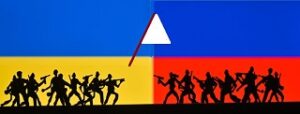 given to Cesare Martinetti in the newspaper La Stampa, Edgar Morin talks about his new book Di Guerra in Guerra (From war to war, editor Rafaello Cortina, 2023) where he reflects on an endless 20th century that lives as a witness, for him there are still things to be digested:
given to Cesare Martinetti in the newspaper La Stampa, Edgar Morin talks about his new book Di Guerra in Guerra (From war to war, editor Rafaello Cortina, 2023) where he reflects on an endless 20th century that lives as a witness, for him there are still things to be digested:
“I wanted to remember not only the terrible physical evils, but also the intellectual evils caused by wars, that is, lies, one-sided views, Manichaeism, hatred for all enemy people, for their culture, their language, their literary and artistic works, and I wanted to help myself and readers to develop this awareness, in the face of a war that risks taking us to the worst, through the process of escalation and radicalization.
His synthesis of this war is that it is militarily localized, but globally globalized, but he has hope that we can escape it.
Remember that in the first years after the fall of the wall, Putin himself came to Germany and made a very pro-European speech, but NATO advances on Russia’s borders irritated him and already in 2015, when there was an agreement on Crimea, the Donbass region broke out in hostilities.
On the other hand, he emphasizes “the wars of reconquest led by Russia in Chechnya and Georgia led the United States, moreover at the request of countries close to Russia, to extend NATO to a siege that the leaders perceived as a threat”.
A shared Donbass suggests the centenary thinker, he knows that his position seems more utopian than realistic, but he thinks that this is the role of thinkers: to mix utopia and realism, after all it is necessary to awaken hope and serenity.
The Machine Learning
Trend Even from the 21st century artificial intelligence  was in a great crisis, could do a lot of logical reasoning, treat and rationalize equations, make inferences, but the volume of “human” data was small, the emergence of the Web and the adhesion of billions. of people enabled a new scenario: Big Data, a large amount of human data.
was in a great crisis, could do a lot of logical reasoning, treat and rationalize equations, make inferences, but the volume of “human” data was small, the emergence of the Web and the adhesion of billions. of people enabled a new scenario: Big Data, a large amount of human data.
This large and complex data can be processed with large-scale accurate results, so that it can be processed by machine so that the machine “learns” trends, this (not by) machine learning is called “Machine Learning”.
With this it is possible to identify opportunities and avoid mistakes such as insisting on “logical” discourses but out of trend, it is not a question of going into fashion, but rather identifying it to correct it or propose other alternatives, and that is the opportunities Real.
Big data identifies data patterns, creates and analyzes the connections between them, and makes the execution of a given also smarter, whether or not it can rely on human supervision. In these two types, supervised and unsupervised, machine “learning” will always be essential, in supervised there is human interaction controlling the input and output of data and thus directly interfering with machine training, while in unsupervised algorithms use deep learning to handle and solve complex tasks without human intervention.
An important algorithm for semantic searches was made by a GitHut team: Hamel Husain. Ho-Hsiang Wu and Tiferet Gazit, and two Microsoft researchers: Miltiadis Allamanis and Marc Brockschmidt, who assess the state of evolution of semantic search algorithms and even make the code available through the GitHub site.
https://arxiv.org/pdf/1909.09436v1.pdf
New tensions and pandemic
In addition to the war between Russia and Ukraine, where tensions are growing, tensions between the United States and China have increased due to an alleged spy balloon that entered the American sky and a new tension between Azerbaijan and Armenia where there are 130 thousand Armenians isolated in substandard conditions. -human activities in the region of Nagorno-Kabarakh, claimed by both countries (map) and with a history of conflicts.
between the United States and China have increased due to an alleged spy balloon that entered the American sky and a new tension between Azerbaijan and Armenia where there are 130 thousand Armenians isolated in substandard conditions. -human activities in the region of Nagorno-Kabarakh, claimed by both countries (map) and with a history of conflicts.
In the war after the delivery of German tanks to Ukraine and American aid, Russia reacted with fury promising a devastating offensive, February 24th will complete a year of war and a strong Russian offensive is expected by then, in addition there are threats to the West and an offensive in Moldavia, which borders Ukraine in the south, and thus create a new combat front.
The balloon that invaded American territory, coming from Canada and according to China was lost, since it will be taken over by the Americans (the overthrow could be dangerous), entered the Montana region, northern USA and with possible nuclear weapons, which led to suspicious, but China claims that the American measure was hasty and that it is just an atmospheric balloon, but tension has risen.
Beijing’s leaders declared that they “would not accept any conjecture or unfounded exaggeration” and accused “some US politicians and media” of using the incident “as a pretext to attack and defame China”, despite the tension the climate is not one of a war and the Taiwan question is a backdrop.
Covid-19 follows a roadmap of uncertainties, now there are indications that Japan is facing a growth of the pandemic, isolated during the previous stages, the country has opened up to tourism and this seems to be one of the indications of this unexpected growth, the use of masks there, for example, it predates the Pandemic.
According to the BBC website, the country reached a historic record on January 20 with 425 deaths in a single day, proportionally higher than Latin America, the United States and South Korea, among others, data is from Our World in Data, which is compiled by the University of Oxford.
There are also fears about side effects of Pfizer’s bivalent vaccine (immunizes the initial variant and new strains), according to the American health control body, the FDA, the analysis carried out on millions of elderly people did not identify a risk of stroke, but experts ask more in-depth study.

